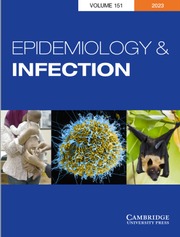Article contents
Antibiotic resistance in Escherichia coli causing generalized infections in chickens in the UK in 1982: the relationship between the results of in vitro and in vivo furazolidone sensitivity tests
Published online by Cambridge University Press: 19 October 2009
Summary
Compared with a similar survey conducted ten years previously, a survey conducted in 1982, eleven years after the implementation of legislation forbidding the routine use of feeds containing ‘therapeutic’ antibiotics, revealed a decreased incidence of resistance to tetracyclines, furazolidone and sulphonamides in Escherichia coli strains causing generalized infections in chickens in the UK; the decrease was particularly marked in the case of tetracycline resistance, 17·9% of strains in 1982 being resistant to this antibiotic compared with 31·2% in 1972.
Giving furazolidone to groups of chickens inoculated intramuscularly with O2:K1 strains of E. coli of differing degrees of furazolidone sensitivity indicated that great care is required in the performance and interpretation of laboratory tests for sensitivity to this antibiotic. Infections caused by strains that required as little as 1·25 μg/ml of furazolidone to inhibit their multiplication in laboratory tests responded poorly to furazolidone treatment; those that were inhibited by less responded well, better than to treatment with tetrac3rcline, chloramphenicol. ampicillin or trimethoprim.
- Type
- Research Article
- Information
- Copyright
- Copyright © Cambridge University Press 1984
References
- 4
- Cited by


